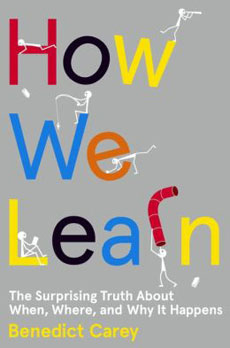"Daniel Willingham, a leading authority on the application of learning techniques in classrooms, advises his own students, when they're reviewing for an exam, not to work straight from their notes. 'I tell them to put the notes aside and create an entirely new outline, reorganizing the material,' he told me. 'It forces you to think about the material again, and in a different way.'
"Isn't how we do something part of the 'environment,' too?
"It is. Yet the larger message of context research is that, in the end, it doesn't much matter which aspects of the environment you vary, so long as you vary what you can. The philosopher John Locke once described the case of a man who had learned to dance by practicing according to a strict ritual, always in the same room, which contained an old trunk. Unfortunately, wrote Locke, 'the idea of this remarkable piece of household stuff had so mixed itself with the turns and steps of all his dances, that though in that chamber he could dance excellently well, yet it was only when that trunk was there; he could not perform well in any other place unless that or some other trunk had its due position in the room.'
"This research says, take the trunk out of the room. Since we cannot predict the context in which we'll have to perform, we're better off varying the circumstances in which we prepare. We need to handle life's pop quizzes, its spontaneous pickup games and jam sessions, and the traditional advice to establish a strict practice routine is no way to do so. On the contrary: Try another room altogether. Another time of day. Take the guitar outside, into the park, into the woods. Change cafes. Switch practice courts. Put on blues instead of classical. Each alteration of the routine further enriches the skills being rehearsed, making them sharper and more accessible for a longer period of time. This kind of experimenting itself reinforces learning, and makes what you know increasingly independent of your surroundings."
